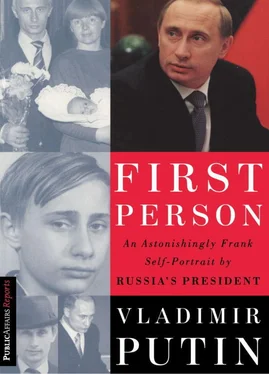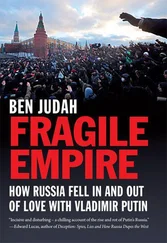Vladimir Putin - First Person
Здесь есть возможность читать онлайн «Vladimir Putin - First Person» весь текст электронной книги совершенно бесплатно (целиком полную версию без сокращений). В некоторых случаях можно слушать аудио, скачать через торрент в формате fb2 и присутствует краткое содержание. Город: New York, Год выпуска: 2000, ISBN: 2000, Издательство: PublicAffairs, Жанр: Биографии и Мемуары, Политика, Политика, Публицистика, на английском языке. Описание произведения, (предисловие) а так же отзывы посетителей доступны на портале библиотеки ЛибКат.
- Название:First Person
- Автор:
- Издательство:PublicAffairs
- Жанр:
- Год:2000
- Город:New York
- ISBN:978-0-786-72327-0
- Рейтинг книги:3 / 5. Голосов: 1
-
Избранное:Добавить в избранное
- Отзывы:
-
Ваша оценка:
- 60
- 1
- 2
- 3
- 4
- 5
First Person: краткое содержание, описание и аннотация
Предлагаем к чтению аннотацию, описание, краткое содержание или предисловие (зависит от того, что написал сам автор книги «First Person»). Если вы не нашли необходимую информацию о книге — напишите в комментариях, мы постараемся отыскать её.
First Person — читать онлайн бесплатно полную книгу (весь текст) целиком
Ниже представлен текст книги, разбитый по страницам. Система сохранения места последней прочитанной страницы, позволяет с удобством читать онлайн бесплатно книгу «First Person», без необходимости каждый раз заново искать на чём Вы остановились. Поставьте закладку, и сможете в любой момент перейти на страницу, на которой закончили чтение.
Интервал:
Закладка:
In Germany there is already a high standard of living, and there’s plenty of prostitution. It’s even legalized.
But there are only foreign women in the brothels. There aren’t any Germans.
How would you know?
So I’ve been told… by people like yourselves from the licentious professions.
Alright. So maybe there are no Germans, but there’s prostitution.
There is prostitution. I’m talking now about the nationality of the participants. They’re all operating openly. And there are no Germans among them, because the standard of living in the country is very high.
So are you for or against the legalization of prostitution?
I don’t think that prostitution should be legalized. You have to combat it with social and economic methods. Then no one will want to go into prostitution. Why—are you in favor of legalization?
Well, you could have doctors in the brothels, then. And the girls would not be ripped off, or mistreated.
You have a kind heart.
Whose proposals do you listen to, and who do you trust? You said that your goal in the first year is to formulate a team. Who is on your team?
Trust? Sergei Ivanov, Secretary of the Security Council.
Have you known each other for a long time?
I’ve known him for a long time, but not very well. We began working together in the Leningrad Directorate of the KGB. At that time I only knew that he existed. Then he went to Moscow, and did several long stints abroad. We had many friends in common. I heard stuff about him from all different people, and it was positive. He knows several languages: English, Swedish, and Finnish, I think. And I think that he is in the right job. He recently returned from the States, where things went very well. He met with Clinton, Albright, and Berger. I’m happy with his work.
But there isn’t anyone you’ve spent a lot of time with.
Of course, it is always better to have had the benefit of direct experience working together. But let’s agree that there is such a thing as comradeship. I get that feeling with Ivanov and with Nikolai Patrushev and also with Dima Medvedev.
Medvedev is heading your election campaign. Is he also from Peter?
He taught civil law at Leningrad University. He has a doctoral degree in jurisprudence and is a fine expert. I needed some people when I worked with Sobchak in the mayor’s office. I went to the law faculty for help, and they suggested Dima. When I was deputy mayor, Dima was my adviser, and he worked with me for about a year and a half. Then, after our unsuccessful elections, he left the mayor’s office and went back to the university.
You recently invited him to Moscow?
Just this year. Actually, I had originally planned for Dima to head up the Federal Securities Commission. He is a specialist in the securities market. He seems to like to working on our team, but we haven’t yet decided specifically where to use him.
Who else?
I trust Aleksei Kudrin. He is now first deputy minister of finances. I think that he’s a decent and professional guy. We both worked for Sobchak and we were both his deputies. In years of working together, you can learn a lot about a person.
And where did Igor Sechin come from?
Sechin also worked with us in Petersburg, in the protocol department. He is a philologist by training. He knows Portuguese, French, and Spanish. He worked abroad, in Mozambique and Angola.
Was he in combat?
Yes. Then he landed on the executive committee of the Leningrad City Council. When I became deputy mayor and was choosing my staff, I considered a lot of people, and I liked Sechin. I suggested that he come to work for me. This was in 1992-1993. And when I went to work in Moscow, he asked to come along, so I brought him with me.
Now what will happen with the old guard in the Kremlin? Everyone says, just wait, Putin will win the elections and he’ll be free of them. In the best case, he’ll fire them.
You know, that kind of logic is characteristic of people with totalitarian mentalities. That’s how they expect a person to behave if he wants to remain in his post the rest of his life. But I don’t want that.
But there are some figures that the public has a uniformly negative reaction to, such as Pavel Borodin. Then there’s also the chief of the presidential administration, Aleksandr Voloshin. He’s not beloved by the public.
Voloshin is not well liked by the public, or by a part of the establishment. As groups and clans fought among themselves, a negative feeling emerged. Voloshin was not immune to it. And these clans fought dirty. I don’t think that’s a basis for firing someone. Voloshin suits me just fine for today. The work he is doing is rather particular. We discussed who could be put in his place, and we considered Dima Medvedev. Voloshin himself said, “Let Dima work as my deputy, and then, when he grows into the job, let him be considered as my replacement.” There’s no sense in second-guessing it now.
But it does make sense to respond to the public’s criticism of officials in the Kremlin and the entourage of the former president.
I, too, have worked for the state for a long time. Am I in the entourage, or not? These questions are all about appearances. The individual, with his knowledge, his professional abilities, and his talents, is worth far more. I will be guided by whether a person fits the post he occupies or not. That’s the most important thing.
In any event, I’m not president yet. First I have to win the elections. And to be honest, I’m a superstitious person, so I try not to think about these things ahead of time. Do you think I should?
You thought you might have to pay for this war with your career, but you became acting president instead.
It probably helped that I didn’t want the president’s job.
And when Yeltsin said that he planned to resign before the end of his term, you didn’t say, “No, what are you doing, Boris Nikolayevich?!”
No, I didn’t try to talk him out of it; but I also didn’t dance with joy and thank him and assure him that I would justify his faith in me. My first reaction was “I’m not ready for this.”
When I was appointed prime minister, it was interesting and it was an honor. I thought, “Well, I’ll work for a year, and that’s fine. If I can help save Russia from collapse, then I’ll have something to be proud of.” It was a while stage in my life. And then I’ll move onto the next thing. About two or three weeks before New Year’s Eve, Boris Nikolayevich invited me into his office and said that he had made the decision to resign. I would become the acting president. He looked at me and waited to see what I would say.
I sat in silence. He started to explain it in more detail—that he wanted to announce his resignation before New Year’s… When he stopped talking, I said, “You know, Boris Nikolayevich, to be honest, I don’t know if I’m ready for this or whether I want it, because it’s a rather difficult fate.”
I wasn’t sure I wanted such a fate…. And then he replied, “When I came here, I also had other plans. Life turned out this way. I, too, didn’t strive for this, but in the end, circumstances forced me to fight for the post of president. Well, I think your fate is forcing you into a decision. Our country isn’t so huge. You’ll manage.”
He paused and became lost in thought. I realized this was hard for him. On the whole, it was a depressing conversation. I had never thought seriously that I might become his successor, so when Boris Nikolayevich told me about his decision, I wasn’t really prepared for it.
Читать дальшеИнтервал:
Закладка:
Похожие книги на «First Person»
Представляем Вашему вниманию похожие книги на «First Person» списком для выбора. Мы отобрали схожую по названию и смыслу литературу в надежде предоставить читателям больше вариантов отыскать новые, интересные, ещё непрочитанные произведения.
Обсуждение, отзывы о книге «First Person» и просто собственные мнения читателей. Оставьте ваши комментарии, напишите, что Вы думаете о произведении, его смысле или главных героях. Укажите что конкретно понравилось, а что нет, и почему Вы так считаете.












